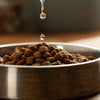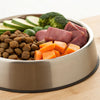Can Cats Eat Dog Kibble? Understanding the Risks and Nutritional Needs
- Houndsy
Table of Contents
- Introduction
- Understanding Pet Nutritional Needs
- Can Cats Eat Dog Kibble? The Short Answer
- What Should You Do if Your Cat Eats Dog Food?
- How to Manage Feeding Routines in Multi-Pet Households
- Nutritional Needs for Cats
- Conclusion
Introduction
As pet owners, we often find ourselves in amusing situations with our furry friends. One common scenario involves our inquisitive cats sneaking bites from the dog's bowl. It raises a valid question: Can cats eat dog kibble? While many of us may chuckle at the sight of our felines nibbling on dog food, understanding the implications of this behavior is crucial for their health.
Interestingly, a survey by the American Pet Products Association found that nearly 70% of U.S. households own a pet, with many having both cats and dogs. This close living arrangement often leads to shared meals, or at least, shared curiosity about each other's food. In this blog post, we will explore the nutritional differences between cat and dog food, the potential consequences of cats eating dog kibble, and how to manage feeding routines in multi-pet households.
By the end, we hope to clarify whether those sneaky bites of dog kibble pose any real danger to our cats and what steps we can take to ensure their diets remain healthy and balanced.
Understanding Pet Nutritional Needs
Cats vs. Dogs: The Nutritional Divide
Cats and dogs have evolved to have very different nutritional requirements, which is essential for their overall health.
- Cats are obligate carnivores. This means they thrive on a diet primarily made up of meat. Their bodies are designed to derive essential nutrients from animal flesh, including high levels of protein and specific amino acids such as taurine.
- Dogs are omnivores. They can digest and utilize a more varied diet that includes both animal and plant-based foods. This flexibility means dogs can thrive on a diet that incorporates grains, vegetables, and meat.
Key Nutritional Differences
When considering whether cats can eat dog food, it is essential to understand the fundamental differences in their diets:
- Protein Requirements: Cats generally require a higher protein content than dogs. While dog food often contains 18-26% protein, cat food typically has a minimum of 30-34% protein, with some premium brands reaching upwards of 40% or more. This is critical for various bodily functions, including muscle maintenance and energy levels.
-
Essential Nutrients: Cats require certain nutrients that are either absent or present in insufficient quantities in dog food:
- Taurine: This amino acid is vital for heart health and eye function. Cats cannot synthesize taurine on their own and rely on their diet for this nutrient. Dog food may not contain adequate levels of taurine, which could lead to serious health issues if consumed long-term.
- Arachidonic Acid: Unlike dogs, cats cannot produce this essential fatty acid, which is crucial for skin health and cellular function.
- Vitamin A: Cats require preformed vitamin A from animal sources, whereas dogs can convert beta-carotene from plants into vitamin A.
- Niacin: This vitamin must be ingested by cats as they cannot convert it from other sources.
Implications of Nutritional Deficiencies
If a cat consumes dog food over an extended period, it risks developing nutritional deficiencies, which can lead to severe health issues such as:
- Heart disease (due to a lack of taurine)
- Vision problems
- Poor coat condition
- Weakened immune system
- Overall malnutrition
Can Cats Eat Dog Kibble? The Short Answer
The short answer is yes, cats can eat dog kibble in small amounts without immediate toxicity or serious health consequences. However, this does not mean it is a suitable or safe long-term solution. If your cat sneaks a few bites of dog food occasionally, it is unlikely to cause harm.
However, if this behavior becomes habitual, it could lead to the aforementioned health issues due to inadequate nutrition. It's essential to monitor their eating habits closely.
What Should You Do if Your Cat Eats Dog Food?
If you find that your cat has been indulging in your dog's kibble, here are some steps to take:
- Observe for Symptoms: Keep an eye on your cat for any signs of distress, such as vomiting, diarrhea, or lethargy. These could indicate that they have consumed too much dog food or have an underlying health issue.
- Consult Your Veterinarian: If your cat frequently eats dog food or shows signs of illness, consult your veterinarian. They can provide guidance on dietary adjustments and offer solutions tailored to your pet's nutritional needs.
- Provide a Balanced Diet: Ensure your cat is on a well-balanced diet that meets their specific nutritional requirements. High-quality cat food is formulated to provide the necessary nutrients for optimal health.
-
Prevent Access: Consider strategies to keep your cat from accessing the dog's food, such as:
- Feeding your pets in separate rooms.
- Using elevated food bowls for dogs that are hard for cats to reach.
- Establishing a feeding schedule to minimize opportunistic snacking.
How to Manage Feeding Routines in Multi-Pet Households
Strategies for Successful Feeding
Managing the feeding routines of multiple pets can be challenging but is essential for maintaining their health. Here are some effective strategies:
- Separate Feeding Areas: Designate specific feeding areas for each pet to avoid food theft. This separation can help each animal focus on their own food without distractions.
- Timed Feedings: Instead of free feeding, establish set meal times for both cats and dogs. This approach helps you monitor their intake and reduces the likelihood of sneaky snacks.
- Use Automatic Feeders: Investing in automatic feeders can help dispense food at designated times, ensuring your pets receive their meals without the risk of others stealing bites.
- Train and Monitor: Training your pets to respect each other's feeding zones can be beneficial. You can also supervise feeding times, which allows you to intervene if one pet tries to steal food from another.
Nutritional Needs for Cats
To ensure your cat remains healthy and happy, it is crucial to provide a diet tailored to their specific needs. Here are some key components to consider:
- High-Quality Protein Sources: Look for cat food that lists high-quality animal proteins as the first ingredient. This ensures your cat receives adequate protein for their energy requirements.
- Essential Nutrients: Choose foods that are enriched with taurine, arachidonic acid, and vitamins A and B. These nutrients are vital for maintaining their health.
- Balanced Diet: Ensure your cat's diet is balanced with the right proportions of protein, fats, and carbohydrates. Consult your veterinarian for recommendations based on your cat's age, weight, and activity level.
Conclusion
In conclusion, while cats can nibble on dog kibble without immediate harm, it is not a suitable long-term diet due to the significant nutritional differences between cat and dog food. As responsible pet owners, it is our duty to provide our furry friends with a balanced diet that meets their specific needs.
If you find your cat sneaking dog food regularly, take proactive steps to ensure they receive the nutrition they require. Consider investing in a Houndsy Kibble Dispenser to simplify and elevate your pet feeding experience. This innovative design not only provides the right portions but also complements your home decor beautifully.
For more information on how to enhance your pet feeding routines, explore our Houndsy Kibble Dispenser today!
FAQ
1. Is dog food toxic to cats? No, dog food is not toxic to cats. However, it does not meet their nutritional needs and should not be a regular part of their diet.
2. What should I do if my cat eats dog food? If your cat occasionally eats dog food, monitor them for any signs of distress. If it becomes a habit, consult your veterinarian for dietary advice.
3. Can cats survive on dog food long-term? No, cats cannot thrive on a diet consisting solely of dog food. Over time, they will develop nutritional deficiencies that can lead to serious health issues.
4. How can I prevent my cat from eating dog food? Feed your pets separately, establish set meal times, and consider using automatic feeders to restrict access to each other's food.
5. What is the best diet for my cat? A high-quality, balanced cat food that contains adequate protein, taurine, and essential vitamins is ideal for your cat's health. Always consult your veterinarian for personalized recommendations.












